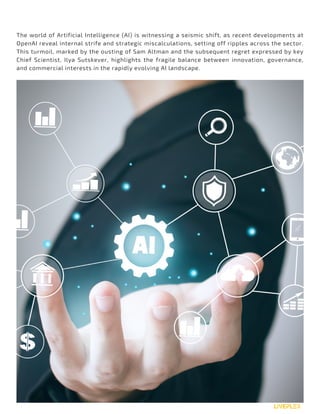In a whirlwind of events, Sam Altman, co-founder of OpenAI, found himself at the center of a storm that raised questions about the future of artificial intelligence (AI). Altman, who helped establish OpenAI as a non-profit research lab in 2015, was unexpectedly removed as CEO, sending shockwaves through the industry. However, his swift reinstatement, accompanied by a new board of directors, left many questions unanswered.
ChatGPT and Altman’s journey
OpenAI, headquartered in San Francisco, is the company behind ChatGPT, the chatbot that has become ubiquitous in various sectors, from education to healthcare. ChatGPT’s rapid commercialization over the past year thrust Altman into the limelight as a leading voice in the discourse surrounding generative AI, a technology capable of producing novel text, imagery, and media. Under Altman’s guidance, OpenAI transformed into a globally recognized startup.
The turbulence: Firing and rehiring
Altman’s tenure at OpenAI took a tumultuous turn within a single week. He was abruptly ousted as CEO, a move that left the industry bewildered. However, his return to the position was equally swift, along with the appointment of a new board of directors. Microsoft, a major investor in OpenAI with rights to its technology, played a pivotal role in Altman’s reinstatement. Furthermore, former OpenAI president Greg Brockman, who had resigned in protest after Altman’s initial removal, also returned to the company. Simultaneously, hundreds of OpenAI employees threatened to resign.
Both Altman and Brockman celebrated their reinstatements via social media, marking a turnaround that caught the attention of the AI community.
Unanswered questions surrounding Altman’s ousting
The initial ousting of Altman remains shrouded in mystery. The announcement cited his failure to be “consistently candid in his communications” with the board of directors but did not provide specific details. This lack of transparency has raised numerous questions about the circumstances surrounding his departure.
The sudden upheaval at OpenAI had profound implications for the AI world, particularly because OpenAI and Altman are influential figures in the field. It has also highlighted concerns regarding trust in AI, a technology that continues to raise questions and uncertainties.
AI ecosystem fragility and governance
The OpenAI episode underscored the fragility of the current AI ecosystem and its ability to address the risks associated with AI. Johann Laux, an expert at the Oxford Internet Institute focusing on human oversight of AI, commented that the turmoil exposed the vulnerabilities in addressing AI’s risks. This incident also accentuated the differing perspectives within OpenAI’s leadership regarding the safety risks posed by AI as the technology advances.
Government’s role in AI regulation
Many experts argue that the OpenAI saga emphasizes the need for governments, rather than large tech companies, to take the lead in AI regulation, especially for fast-evolving technologies like generative AI.
Enza Iannopollo, principal analyst at Forrester, pointed out that corporate governance alone cannot deliver the level of safety and trust in AI that society requires. She stressed the importance of rules and regulations designed collaboratively with companies and rigorously enforced by regulators. This collaborative approach is seen as essential to ensure responsible AI development.
The role of generative AI
Generative AI, including chatbots like ChatGPT, differs from traditional AI by creating new content rather than following predetermined rules. This distinction has led to discussions about the regulation of AI systems like ChatGPT and the need to address their unique challenges.
Global AI regulation efforts
While tech companies have taken the lead in governing AI and its risks, governments worldwide are working to catch up. In the European Union, negotiations are underway to establish comprehensive AI regulations. However, the process has been complicated by the inclusion of commercialized large-language models, such as ChatGPT, into the legislation.
In the United States, President Joe Biden signed an executive order aimed at balancing the interests of technology companies with national security and consumer rights. This order is the initial step in ensuring that AI is trustworthy and beneficial without compromising public safety.
The turbulence at OpenAI, involving the sudden exit and reinstatement of Sam Altman, has brought to light the complex dynamics surrounding AI governance and regulation. It underscores the critical role that governments must play in shaping the responsible development and use of AI technologies. As AI continues to advance and become more integrated into our daily lives, the need for clear rules and ethical guardrails becomes increasingly apparent. The OpenAI episode serves as a reminder that the responsible deployment of AI requires collaboration between governments, tech companies, and experts to ensure the benefits of AI are realized while mitigating potential risks.





